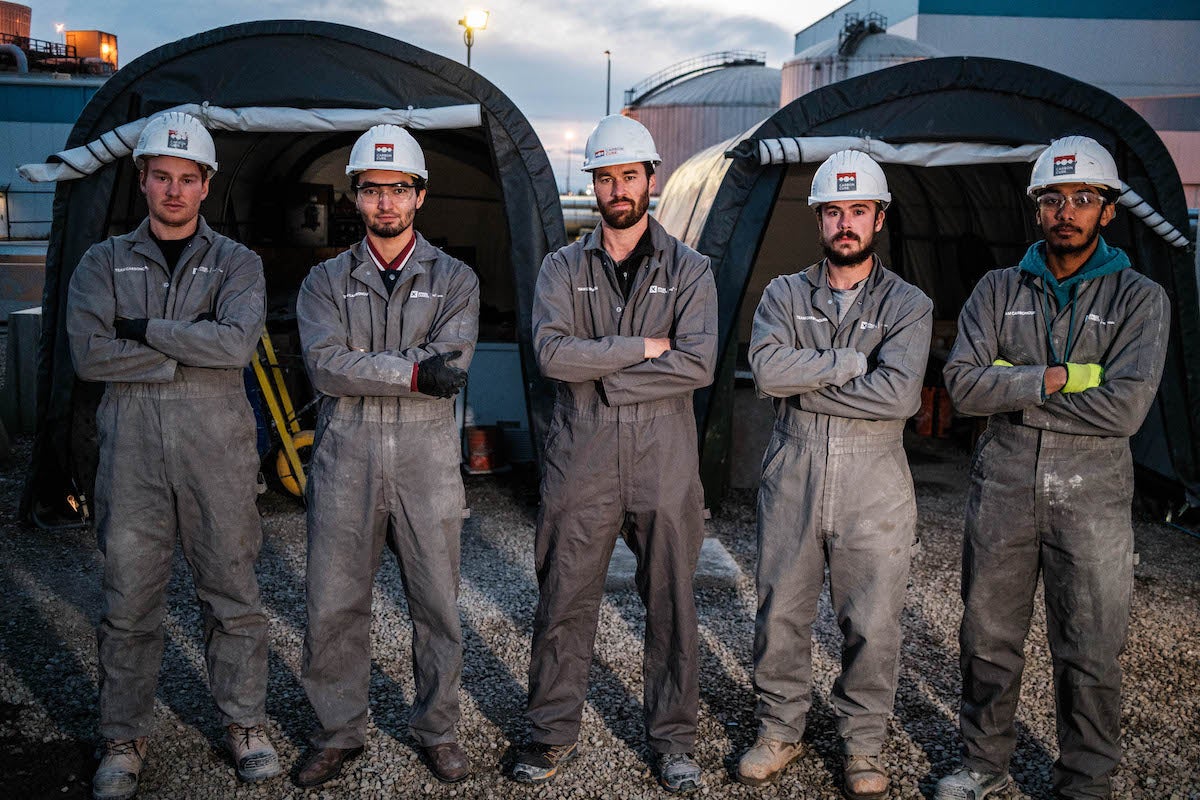When we first set up the $20M NRG COSIA Carbon XPRIZE back in 2015, the idea of converting carbon into useful products was one that few people had heard of. The Prize, which aimed to spur breakthrough technologies to convert CO₂ emissions into everything from fuel to building materials, was the first-ever prize of its type.
Today, carbon capture and utilization are thankfully higher up the news agenda, with global tech companies, governments, and environmentalists understanding that a circular carbon economy is one of our greatest hopes in safeguarding the future of the planet. Finding valuable ways to reuse carbon is central to this model, and if carbon can be used to make a product that is often otherwise made from fossil fuels? Even better.
Teams from the $20M NRG COSIA Carbon XPRIZE have gone on to do exciting things since the Prize ended in April 2021, leading the charge into an exciting new era of carbon tech. Here’s an update on where some of the teams are now…
CarbonBuilt: Captured CO₂ to eco-friendly concrete
The LA-based startup CarbonBuilt was one of the two winners of the NRC COSIA Carbon XPRIZE along with CarbonCure Technologies. CarbonBuilt has recently announced some exciting news: they have raised $10M in Series A Funding, following their $20M XPRIZE win.
The team started out of a UCLA research team led by civil engineering professor Gaurav Sant. Their tech focuses on injecting carbon dioxide emissions from power plants and other industrial facilities into concrete that can be used for construction, and in the process, helps construction companies reduce their own footprint. CarbonBuilt has run two successful test pilot projects within the past year.
“We are honored to have such stellar investors standing behind the company,” Rahul Shendure, CarbonBuilt’s chief executive, said in the announcement. “They share our conviction that carbon dioxide utilization has a critical near-term role to play in humanity’s path towards a zero-carbon future. Enabled by CarbonBuilt’s technology, the concrete products industry is uniquely positioned to deliver on this promise.”
Dimensional Energy: Captured CO₂ to Jet Fuel
In the future, our flights could be powered by fuel made out of recycled CO₂, reducing our carbon footprints. Dimensional Energy is spearheading this movement. The startup hopes to get its sustainable jet fuel certified for use to begin trialing with an airline company as soon as 2022, according to Fast Company.
The tech, which came out of research at Cornell University, uses electrolysis to split water and produce hydrogen. The hydrogen is then mixed with CO₂ in a reactor to make synthetic gas (aka syngas), which can be converted into liquid fuel and refined into jet fuel. If scaled and implemented, the technology could help counter the 2.5% of global carbon dioxide emissions produced by air travel as post-pandemic travel bounces back.
In the short term, Dimensional Energy plans to capture their carbon from cement plants, but in the long term, they are interested in converting carbon captured through Direct Air Capture – tech that captures CO₂ directly from the air ( a type of tech that will be accelerated by the $100M Carbon Removal XPRIZE).
Air Company: Captured CO₂ to perfume
The ambitious Brooklyn-based startup Air Company is known for transforming carbon into unexpected products. They started with vodka, then hand sanitizer, now they have turned their hand to perfume.
The ethanol used in perfume is usually created by fermenting and distilling a grain like corn, which is intensive in water use, as well as creating emissions from fertilizer and fuel. Instead, Air Company have found another way of doing things.
Their technology captures carbon dioxide from a traditional ethanol producer near their HQ and combines it with hydrogen made from electrolysis. Using their proprietary technology, which mimics photosynthesis, they are able to create ethanol. Everything in the process runs on renewable electricity and any extra water can be recycled back into its hydrogen production.
The perfume created with the ethanol is called Air Eau de Parfum and has notes of fig leaf, orange peel, jasmine, violet, powdery musk, and tobacco.
“What we’re able to create is a great proof of concept, but where we’re able to have real impact on CO2 reduction, from an emissions reduction point of view, is when we’re able to then implement it into big business and into their pipelines as well,” Cofounder and CEO Gregory Constantine told Fast Company.
In the future, Air Company have their sights set on turning carbon into jet fuel.
